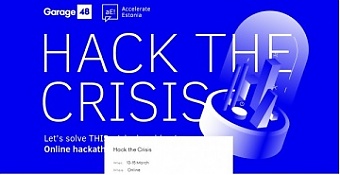Covid-19, Crisis, Estonia, Good for Business, Innovations, Internet, Technology
International Internet Magazine. Baltic States news & analytics
Friday, 19.04.2024, 23:24
Estonian hackathon transformed into global movement
 Print version
Print version |
|---|
The goal of the four-day technology marathon is to create solutions that help people stop the spread of coronavirus and stimulate the economy.
In mid-March, immediately after an emergency situatiojn was declared in Estonia, the public and private sector organized a two-day online hackathon to help deal with the crisis. Several technological solutions were created as a result of the hackathon. For example, the map at https://koroonakaart.ee that displays the current data about the spreading of the virus; the chatbot SUVE at https://eebot.ee/, a source of reliable information about the crisis; the health questionnaire at https://coronatest.ee that helps to assess the risk of infection; and the platform https://vaab.ee that connects volunteers with a medical background.
Seeing how quickly it is possible to find real solutions for dealing with the crisis, President Kersti Kaljulaid invited other countries to organize hackathons as well. The Hack the Crisis movement began in Estonia and has now reached over 40 countries, with more than 100,000 participants. The hackathon closely involves Estonian embassies and honorary consuls around the world who are using their networks to invite other countries and developers to join.
According to former president Toomas Hendrik Ilves, who is the spokesperson for the global hackathon that connects the international technology community, the hackathon planned for April will be the largest ever organized.
"The crisis is far from over, and we have to prepare now to ensure a brighter future. In that respect, we have only one chance -- to work towards solutions that will improve our long-term resilience," Ilves said.
"We have to take a long hard look at what could happen to our economy, how we have been handling social relationships, how resilient our social and healthcare systems are, and how we could support the creative industries. We must also develop methods for dealing with similar situations in the future," he added.
"Online, people can get together without any border restrictions. They can work at a frenzied pace on solutions that benefit all humankind. We are in a unique situation -- the entire world is facing the same problem and working together to solve it. If we are efficient enough, these ideas could already be helping the people who need it most," Ilves said.
By now, the initiative that started in Estonia also includes, for example, Italy, Latvia, Poland, Ukraine, Lithuania, Finland, Moldova, Germany, Belarus, India, the United Kingdom, Austria, Belgium, Brazil, Hungary, Canada, France, Bulgaria, Switzerland, Sweden, Portugal, Turkey, Norway, Holland, Afghanistan, Kosovo, Denmark, Australia, Cyprus, Albania, Madagascar, Benin and Georgia. More countries will be added to the list as necessary.
- 28.01.2022 BONO aims at a billion!
- 26.08.2021 LLC Dizozols Investments finalizes investment attraction deal with Crowdestor with record-high profits
- 13.02.2021 Моя жизнь в газете. Очерки по новейшей истории Латвии. Глава 1
- 30.12.2020 Накануне 25-летия Балтийский курс/The Baltic Course уходит с рынка деловых СМИ
- 30.12.2020 On the verge of its 25th anniversary, The Baltic Course leaves business media market
- 30.12.2020 Business Education Plus предлагает анонсы бизнес-обучений в январе-феврале 2021 года
- 30.12.2020 Hotels showing strong interest in providing self-isolation service
- 30.12.2020 EU to buy additional 100 mln doses of coronavirus vaccine
- 30.12.2020 ЕС закупит 100 млн. дополнительных доз вакцины Biontech и Pfizer
- 29.12.2020 Latvia to impose curfew, state of emergency to be extended until February 7








 «The Baltic Course» Is Sold and Stays in Business!
«The Baltic Course» Is Sold and Stays in Business!

